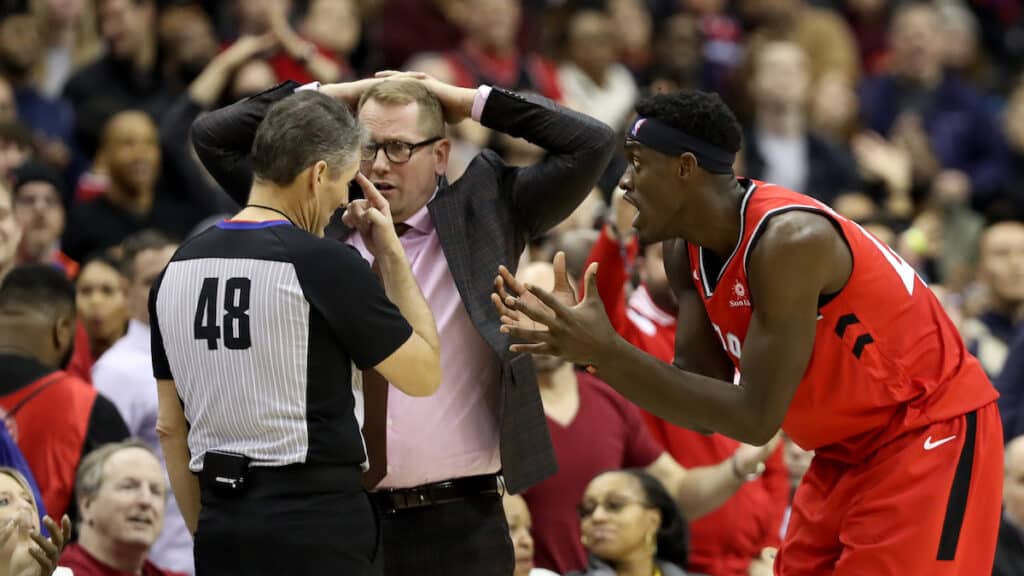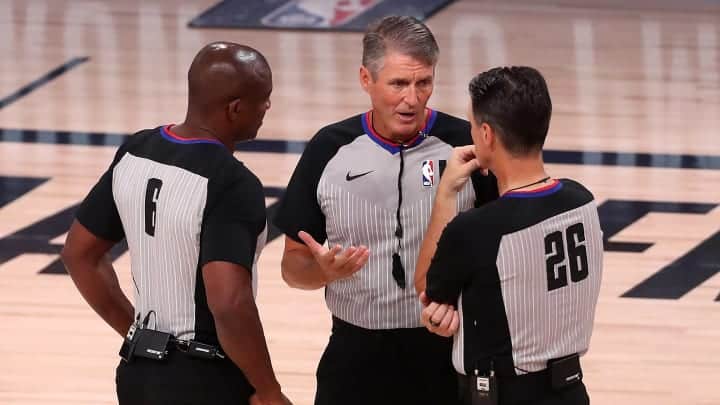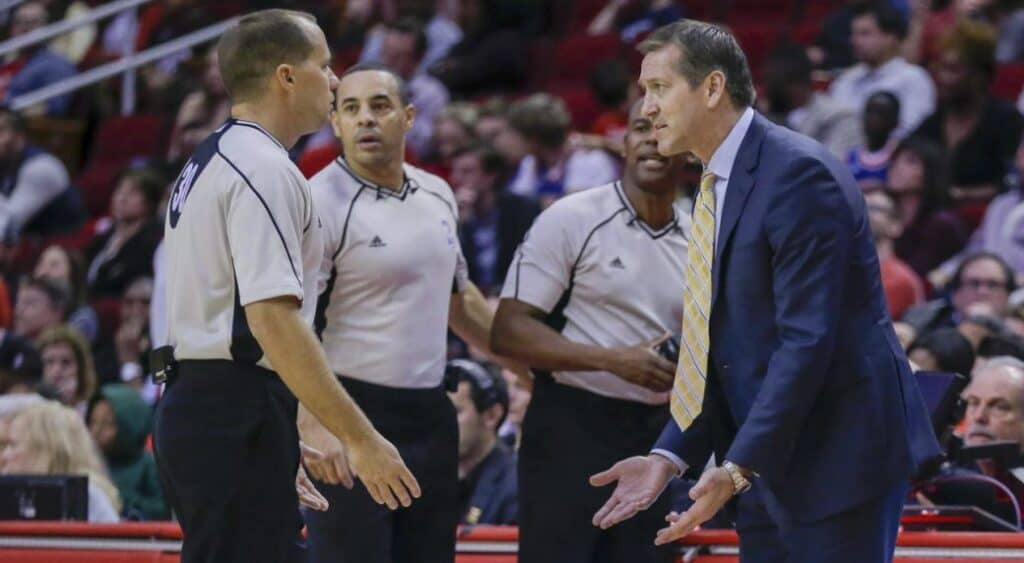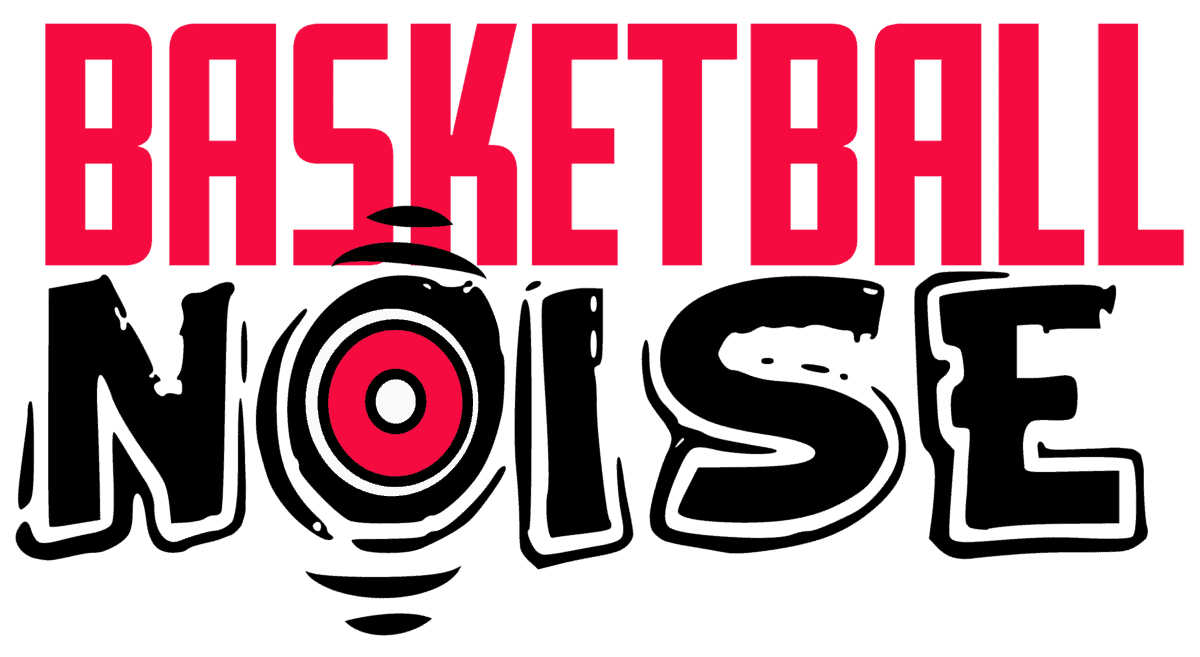Almost any basketball fan will be able to tell you their favorite player’s number. But have you ever wondered why referees wear numbers? If you have not noticed before, all NBA referees have numbers on the back of their jerseys. This leads to the question of why do NBA referees have numbers on their uniforms?
Why do NBA referees have numbers on their uniforms? The numbers on uniforms are to track referees and give them credit for good calls and continuous bad calls means training for referees.
We take a look at how NBA referees get called up on their good calls and their bad calls. We also look at how the jersey numbers are assigned to NBA referees. We also list all NBA referee’s jersey numbers for your reference.
NBA Referees
NBA referees have a number on the back of their uniforms to make them easier to identify. The league uses the numbers for tracking calls made during the games. Fans are also able to quickly search referees by their number through a simple google search. Wikipedia lists every referee and their appointed number. It is similar to players wearing numbers for identification purposes. The only difference is players’ jerseys also have their last name, while referees do not. But why do referees need to be identified regularly? There are quite a few reasons.
NBA Referees can pull in some serious coin. Still, the salary varies a lot depending on experience and the assignment itself. According to CareerTrend.com, Rookie officials earn $600 per game or $250,000 per year. More experienced officials can earn $3500 per game or $500,000 per year. Officiating in post-season games can make an additional $800-$5000 per game.

The NBA is cautious about who they keep on their payroll. The road to becoming an official for the NBA begins at a young age and shares many parallels with becoming an NBA player. It starts with officiating youth games and taking courses to be certified in youth sports. The next step would be high school games and becoming certified through a sanctioned program by the National Federation of State High School Association. After high school, college-level games and educational programs are endorsed by the National Junior College Athletic Association, the National Collegiate Athletic Association, or the National Association of Intercollegiate Athletics.
College competition for referees picks up drastically, as it does with the players. The top collegiate players are scouted by the NBA and participate in summer camps with the G League or Summer League accompanied by veteran referees that provide guidance and education. The league scouts about 100 officials each year. The top of the class will work with the G League until they are deemed prepared to referee NBA games. This lengthy process weeds out many people from having the opportunity to officiate regular season or playoff NBA games. But that doesn’t mean that their job is safe just because they made the NBA.
Do Referees get in Trouble for Making Bad Calls?
NBA referees take a lot of heat. It is a bit of a thankless job in the public eye. When was the last time you heard someone talk about a referee doing a good job? Never. Anytime a referee gets mentioned, it is for a poor call they made. Or a game that was ruined by officiating. But do they ever get reprimanded for their mistakes? Angry fans everywhere will be happy to know that yes, they do.
Officials are held to a high standard by the league. All of their calls are tracked, assessed, graded, and made into a league office report. One lousy call won’t result in a fine. But underperforming history can result in extra training for the referee, which will disqualify them from officiating some of the more high-profile matchups. If a referee can’t keep up to the NBA’s standard, they will eventually be let go.

Referees will get rewarded for a history of making the right calls and high-level officiating. The league can applaud refs with unique work like officiating the playoffs, NBA finals, or NBA All-Star weekend. Having numbers on the back of their jerseys makes the league office’s job a lot easier to track referee performance and give credit where it’s due.
How are NBA Referee Jersey Numbers chosen?
Once officials make it to the regular full-time staff in the NBA, they are assigned a number by the league without being given a choice. However, suppose a number becomes available sometime during the regular season. In that case, officials can request a number change to whatever is available. If there are multiple requests on the same number, whoever has seniority gets first dibs.
There is no written rule on this, but allegedly the league reserves lower numbers for more veteran officials. It’s considered taboo for a newer referee to request a lower number. However, some officials receive a high number when they enter the league and keep it throughout their careers.

When Legendary NBA referee Joey Crawford retired, the commission retired his jersey number 17 as a sign of respect. If an official were to request the number 17, the NBA would ask Joey for approval.
There are 73 staff officials and six non-staff officials for the 2020-2021 NBA Season. According to Wikipedia, NBA referees oversee 120 pre-season games, 1,260 regular-season games, and four rounds of playoff games. These officials watch the real-time competition between 10 of the world’s greatest athletes at a time and make calls with 95% accuracy.
2020-2021 Referee Officials Jersey Numbers
- Ray Acosta, #54
- Brandon Adair, #67
- Bennie Adams, #47
- Mark Ayotte, #56
- Brent Barnaky, #36
- Curtis Blair, #74
- Matt Boland, #18
- Tony Brothers, #25
- Tony Brown, #6
- Nick Buchert, #3
- John Butler, #53
- James Capers, #19
- Derrick Collins, #11
- Sean Corbin, #33
- Kevin Cutler, #34
- Mousa Dagher, #28
- Eric Dalen, #37
- Marc Davis, #8
- JB DeRosa, #62
- Mitchell Ervin, #27
- Kane Fitzgerald, #5
- Tyler Ford, #39
- Brian Forte, #45
- Scott Foster, #48
- Pat Fraher, #26
- Jacyn Goble, #68
- John Goble, #30
- Jason Goldenberg, #35
- Nate Green, #65
- David Guthrie, #16
- Lauren Holtkamp, #7
- Simone Jelks, #81
- Bill Kennedy, #55
- Courtney Kirkland, #61
- Marat Kogut, #32
- Karl Lane, #77
- Eric Lewis, #42
- Mark Lindsay, #29
- Tre Maddox, #23
- Suyash Mehta, #82
- Ed Malloy, #14
- Ken Mauer, #41
- Rodney Mott, #71
- Ashley Moyer-Gleich, #13
- Matt Myers, #43
- Andy Nagy, #83
- Brett Nansel, #44
- J.T. Orr, #72
- Gediminas Petraitis, #50
- Phenizee Ransom, #70
- Derek Richardson, #63
- Leroy Richardson, #20
- Natalie Sago, #9
- Jenna Schroeder, #84
- Evan Scott, #78
- Kevin Scott, #24
- Aaron Smith, #51
- Michael Smith, #38
- Bill Spooner, #22
- Jonathan Sterling, #17
- Ben Taylor, #46
- Dedric Taylor, #21
- Josh Tiven, #58
- Scott Twardoski, #52
- Justin Van Duyne, #64
- Scott Wall, #31
- CJ Washington, #12
- Tom Washington, #49
- James Williams, #60
- Leon Wood, #40
- Haywoode Workman, #66
- Sean Wright, #4
- Zach Zarba, #15
Non-staff officials Jersey Numbers
- John Conley, #79
- Robert Hussey, #85
- Brandon Schwab, #86
- Danielle Scott, #87
- Matt Kallio, #88
- Dannica Mosher, #89
